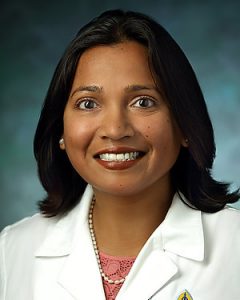Takeaway
When a patient is unresponsive, loved ones may have differing ideas about the patient’s condition. We can hold these contradictions with compassion and see them as expressions of love.

Passion in the Medical Profession | May 3, 2023 | 1 min read
By Avani Prabhakar, MBBS, MPH, Johns Hopkins Medicine
He was fifty years old. Friends called him Mickey. He named his daughter Chance. Mickey told me, “She was born by chance when I was just 18.” He chuckled. Mickey shared that his marriage became strained after seven more children were born. “And they weren’t born by chance,” he said.
Chance told me that on the day after Mickey’s fiftieth birthday, when he was helping his nephew move some big pieces of furniture, he fell flat on his face. His niece, an EMT, thought he had fallen into a diabetic coma and rushed over with sugar. Mickey wasn’t breathing. The niece called EMS and started CPR. EMS arrived, shocked his heart, and took Mickey to the hospital in a helicopter.
A week later, a neurologist told the large family gathered in Mickey’s room that Mickey would never be himself again. His mother cried, “I don’t want him to suffer. He doesn’t want these tubes.”
“He can’t die,” declared his sister. “Doctor, you’re giving up.”
“Did I do enough CPR?” the niece asked. “Should I have done more?”
“You did enough,” the cardiologist assured. “Sometimes things just don’t work out.”
We listened as the family dialogue continued. “Can he hear us?” “I think he smiled!” Then they playfully disagreed with each other, “No he only smiles for me. I’m the favorite.”
“I just sang to him, and he didn’t like it, I saw him frown. I am a terrible singer. The neurologist says he can’t hear us, but I know my son is there.” Mickey’s mother said. We kept listening.
When we hold a family’s conflicting or contradictory statements about a patient’s responsiveness with compassion and see them as expressions of love, it may bring us a sense of ease and joy in the midst of tragedy.
This piece expresses the views solely of the author. It does not necessarily represent the views of any organization, including Johns Hopkins Medicine.

